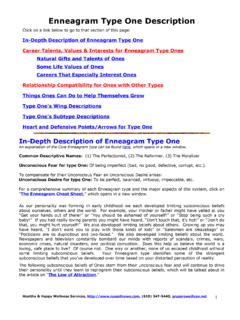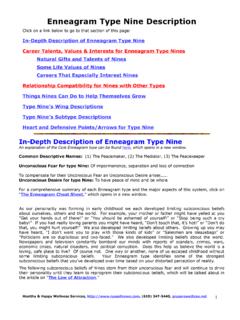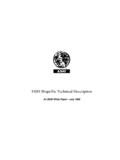Transcription of Enneagram Type Six Description - Russell Rowe
1 Enneagram Type Six DescriptionClick on a link below to go to that section of this page:In-Depth Description of Enneagram Type SixCareer Talents, Values & Interests for Enneagram Type SixesNatural Gifts and Talents of SixesSome Life Values of SixesCareers That Especially Interest SixesRelationship Compatibility for Sixes with Other TypesThings Sixes Can Do to Help Themselves GrowType Six s Wing DescriptionsType Six s Subtype DescriptionsHeart and Defensive Points/Arrows for Type SixIn-Depth Description of Enneagram Type SixAn explanation of the Core Enneagram type can be found here, which opens in a new window. Common Descriptive Names: (1) The Loyal Skeptic, (2) The Loyalist, (3) The QuestionerUnconscious Fear for type Six: Of being unable to survive on their own; of being abandoned; having no supportTo compensate for their Unconscious Fear an Unconscious Desire Desire for type Six: To have safety and security; to have supportFor a comprehensive summary of each Enneagram type and the major aspects of this system, click on The Enneagram Cheat Sheet, which opens in a new our personality was forming in early childhood we each developed limiting subconscious beliefs about ourselves, others and the world.
2 For example, your mother or father might have yelled at you Get your hands out of there! or You should be ashamed of yourself! or Stop being such a cry baby! If you had really loving parents you might have heard, Don t touch that, it s hot! or Don t do that, you might hurt yourself! We also developed limiting beliefs about others. Growing up you may have heard, I don t want you to play with those kinds of kids or Salesmen are sleazebags or Politicians are so duplicitous and two-faced. We also developed limiting beliefs about the world. Newspapers and television constantly bombard our minds with reports of scandals, crimes, wars, economic crises, natural disasters, and political corruption. Does this help us believe the world is a loving, safe place to live? Of course not. One way or another, none of us escaped childhood without some limiting subconscious beliefs.
3 Your Enneagram type identifies some of the strongest subconscious beliefs that you ve developed over time based on your distorted perception of following subconscious beliefs of Sixes stem from their unconscious fear and will continue to drive their personality until they learn to reprogram their subconscious beliefs, which will be talked about in the article on The Law of Attraction. Healthy & Happy Wellness Services, , (619) 347-5440, Subconscious Beliefs for type Six: The world is a dangerous and threatening place. Most people have hidden agendas and are not to be trusted. My safety depends on knowing people s intentions. I must rely on something (like a religion or belief system) or someone outside myself for security. To be loved I must be loyal and supportive ALL the Coping Strategies for Sixes: (where Sixes focus their attention because of their subconscious beliefs) Looking for something and/or someone outside the self to believe in and put loyalty into Vigilance and alertness; looking for hidden agendas Doubt/mistrust others; Test other s loyalty Question others intentions; Question authority Cope with fear by acting strong (or smart) to win support and/or by acting sexy or coquettish to attract support Being dutiful and aligning with others to feel safe Being prepared emotionally for worst case situations Being warm/pleasing to disarm potential hostility Fitting in to society and working for common goalsHere s a brief profile of some healthy, very healthy, average, unhealthy and destructive type Six Sixes are trustworthy, responsible, dependable, loyal and sympathetic to underdog causes.
4 They re engaging, friendly, endearing and genuinely likeable people. Healthy Sixes are able to create camaraderie with people because they enjoy making pleasant and harmonious connections. They like creating strong personal bonds of friendship with others and having a sense of belonging. Trust is extremely important to all Sixes not just healthy ones. That s because of their unconscious fear of being abandoned or left without support. Even healthy Sixes question people and their motives to make sure that they are trustworthy. Their alert and vigilant mentality allows healthy Sixes to be intuitive and insightful about people. Healthy Sixes are warm, personable and even playful once they can trust someone, but that trust is not given blindly. Once you ve earned a Sixes trust, however, they will be the best friend you ve ever had truly committed, compassionate, supportive and Sixes are the bedrock and foundation of any society.
5 They work well with people, treat everyone as equals and believe in cooperation. They are extremely hard working for common goals and like to provide, as well as have, stability, security and loyalty in all areas of their life, especially home, relationships, job, community, etc. Healthy Sixes like being part of some cause or movement greater than themselves, especially those that support the underdog. They want to make a contribution to the world and enjoy being of service to others. They are honorable and conscientious. They are also meticulous, good with details and have an eye for seeing potential problems before they arise. Their self-discipline enables them to organize people and resources, prioritize tasks to be done and see projects through to completion. Healthy Sixes are persevering and can be counted on to be right by your side when difficulties or even calamities occur.
6 Healthy Sixes, while having occasional self-doubts, generally are able to trust themselves and their decisions. In short, healthy Sixes are deeply devoted and committed to the well-being of their family, friends, and & Happy Wellness Services, , (619) 347-5440, healthy Sixes, like Robert F. Kennedy* and J. Edgar Hoover*, are courageous, self-confident, positive thinking and self-reliant. They have unwavering faith in themselves as well as other people and the universe. They are self-affirming and trust their own inner guidance and abilities implicitly. They often become strong, cooperative, expressive leaders that work exceptionally well with others for the good of humanity. Since Sixes greatest fears are being without any inner strength, guidance, support or security, very healthy Sixes become powerful channels for helping people find these inner resources within themselves.
7 Very healthy Sixes are serene, emotionally balanced and open-minded. Much to their surprise, some very healthy Sixes discover a well-spring of undiscovered creative talent.* My speculations based on their lives and my experience with the EnneagramAverage Sixes become self-doubting, fearful and anxious. They re not fully sure of themselves or who or what they can trust. They have a difficult time trusting their own mind even. While all Sixes instinctively anticipate where danger might arise so they can protect themselves, some Sixes are phobic and befriend others or withdraw to protect themselves while others are counterphobic and confront others or fearful situations head-on, even seeking them out. Both phobic and counterphobic Sixes have underlying feelings of fear and anxiety and both can be defensive, mistrustful and suspicious that others may turn against them or take advantage of them if they re not careful.
8 They fear the worst and are hyper-vigilant. They anticipate Sixes look outside themselves for guidance, support, stability and reassurance all the while not wanting to feel dependent on anyone. They invest their time and energy in people and organizations they think will be reliable, trustworthy and give them security people and organizations who they feel safe with. Unfortunately, the more Sixes depend on these people the more anxious they feel inside. They can lose their sense of inner strength and faith in themselves in the process. Average phobic Sixes often look to authorities, self-confident people and/or belief systems to provide them with some semblance of security. Counterphobic Sixes are more independent. They can be more reactionary, tough, and Sixes can easily get themselves overextended with too many commitments. That s because they tend to feel responsible to everyone important to them (often their boss, spouse or partner, children, parents, church leader, etc.)
9 And try to do what is expected of them. Average Sixes want to feel accepted and fit in but they can feel ambivalent and indecisive about their commitments. They easily get stressed out and worry when they realize they can t fulfill all the commitments they ve made, especially when these important people ask for their (the Six s) help at the same time. When this happens Sixes can get nervous, insecure and anxiously react to the perceived demands being made of them by getting defensive, passive-aggressive or being evasive. They feel pressured yet fear that they ll undermine their own security if they give up any of their commitments to key people in their life. What to do? Despite wanting predictability in their life, average Sixes can be quite unpredictable in their emotional reactions (due to their inner confusion and apprehension) when they feel trapped or they re afraid. They have a tendency to complain and blame others for their own problems.
10 They can also be pessimistic and tend to see the glass as half empty rather than half full. Average Sixes can be very indecisive and procrastinate on tasks when their anxiety is high or they fear that others are going to get mad at Sixes feel more and more insecure and unconfident in themselves so they blame others for their own problems and anxieties. They feel a strong need to escape from the pressure of their own doubts and inner anxiety. Unhealthy phobic Sixes can become stubborn and defensive. They oscillate between being explosively reactionary and clingingly dependent. They can explode under pressure but then react by clinging for fear of undermining their security by what they ve said or done. Some phobic Sixes will blow up at safe people rather than those closest to them so that they won t undermine their security with key people in their life.







